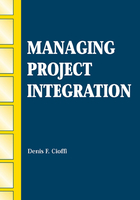
PROJECT MANAGEMENT AS INTEGRATION MANAGEMENT
The words “integrate” and “integration” have meanings outside the sphere of mathematics. To integrate means to “make entire or complete,” and integration represents creating the whole “by adding together or combining separate parts.” [8]
If only some fraction of a project’s separate parts is being managed, a project is not being managed in an integrated manner. An individual may feel responsible for a budget or a schedule or a scope—but who integrates and begins managing the project? Even if the fraction approaches 100 percent, the project is not necessarily being managed systematically (i.e., as a system). If not integrated, the project is, by definition, only partially managed. To say, therefore, that one is managing a project implies integration management.
The expanded notion taken in this book sets an even higher standard. If a project manager integrates budget, schedule, and scope, but is not concerned with the so-called stakeholders and the people on the project team, the integration task is incomplete.
The following chapters describe particular areas within the management of a project where integration is especially important, or where a certain tool or process furthers integration efforts. Chapter 2 examines the concept of knowledge more thoroughly and begins the discussion of integration management with the idea of sharing information from the start. Much of integration occurs in the development of the project plan, and thus the major section of this book, Chapter 3, is devoted to this topic. Chapter 4 takes a new look at earned-value analysis, which is a major integration tool.
In the context of integration, Chapter 5 looks briefly at people issues, and Chapter 6 discusses integrity. In many ways, the most difficult and important discussion takes place in Chapter 6. If all the project’s processes and special techniques are planned and prepared correctly, but there is no integrity, the project will fail.